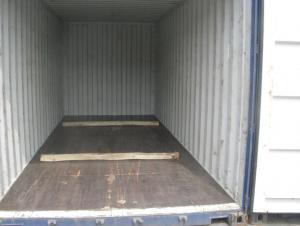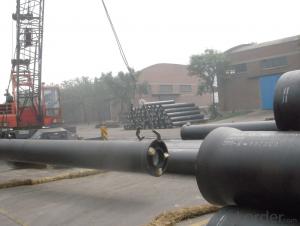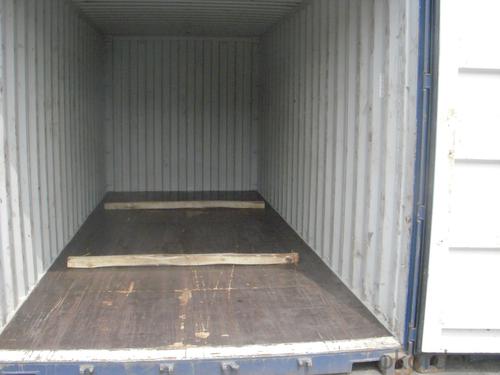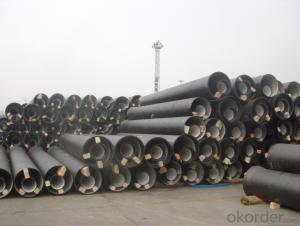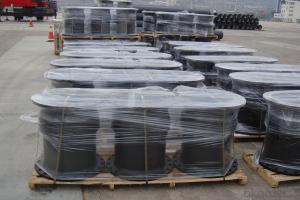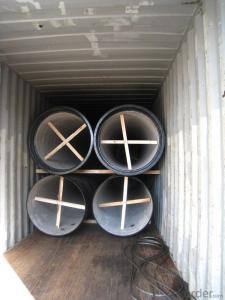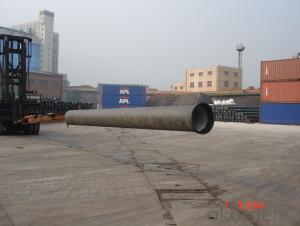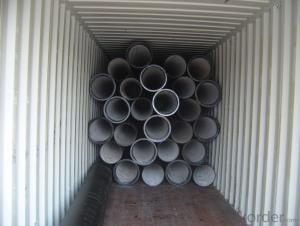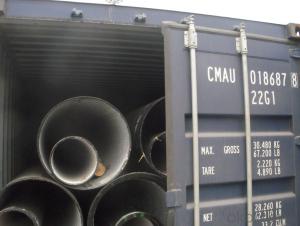DUCTILE IRON PIPES AND PIPE FITTINGS k8 CLASS DN1500
- Loading Port:
- Tianjin
- Payment Terms:
- TT OR LC
- Min Order Qty:
- 22 pc
- Supply Capability:
- 3000 pc/month
OKorder Service Pledge
OKorder Financial Service
You Might Also Like
Material : Ductile Cast Iron
Size Range : DN 80mm to DN 2000mm
Unit Effective Length : 6m or 5.7m
Manufacture Standard: ISO 2531:1998/ EN 545:2006/EN 598:2007
Annual capacity : 200,000 tons
Coating Exterior: Zinc 130g/m2 according to ISO 8179-1 and bitumen coating 70 microns.
Cement Interior: Portland Cement/ High Alumina Cement/ Sulphate Resisting Cement Lining according to ISO 4179
Special requirements on external coating and internal lining can be applied
We also provide accessories such as SBR/EPDM rubber gaskets, lubricant paste, pipe caps, PE sleeves, etc.
Additional Parts:
Each pipe is strictly inspected according to related standard to ensure permanently high performance.
Easy Installation at site and service free for life
Long Service Lifespan
Quotation will arrive you within 24hours once we get your inquiry.
We guarantee offering you a competitive price.
A copy of original inspection reports of pipes will be offered after shipment.
Photos of loading process will be sent to the customer after shipment effect.
We will follow-up the delivery progress after shipment effect and update to the customer on weekly basis.
- Q: What is the relationship between continuous cast iron pipe and ductile iron pipe?
- Continuous cast iron pipes are usually grey cast iron pipes. Its tensile strength and elongation are much lower than those of nodular cast iron. In chemical composition, grey cast iron has less carbon content than nodular cast iron. According to the organization, the graphite form of gray iron is flaky, and the graphite form in spheroidal graphite cast iron is spherical.
- Q: Can ductile iron pipes be used for water main extensions?
- Yes, ductile iron pipes can be used for water main extensions. Ductile iron pipes have excellent strength and durability, making them suitable for carrying water over long distances and withstanding high pressure. They are corrosion resistant and have a long lifespan, making them a reliable choice for water main extensions.
- Q: Are ductile iron pipes suitable for hydroelectric power plants?
- Yes, ductile iron pipes are suitable for hydroelectric power plants. They possess excellent strength, durability, and corrosion resistance, making them ideal for transporting water in the power generation process. Additionally, their flexibility allows for easier installation and maintenance, reducing potential downtime in hydropower operations.
- Q: What is the difference between ductile iron pipes and cast iron pipes?
- Ductile iron pipes and cast iron pipes are both commonly used in various applications, but they differ in their composition, properties, and manufacturing processes. Composition: Ductile iron pipes are made from a type of cast iron known as ductile iron, which contains higher levels of carbon, silicon, and other alloying elements like magnesium. On the other hand, cast iron pipes are made from regular cast iron, which has a higher carbon content and lower levels of alloying elements. Properties: Ductile iron pipes are known for their high tensile strength, flexibility, and durability. They can withstand higher pressure and have a greater resistance to impact, making them suitable for applications that require robust performance. In contrast, cast iron pipes are more brittle and fragile, which makes them prone to cracking or breaking under pressure or impact. Manufacturing process: Ductile iron pipes are created through a process called centrifugal casting, where molten ductile iron is poured into a spinning mold. This centrifugal force helps in distributing the molten metal evenly, resulting in a strong and uniform pipe. Cast iron pipes, on the other hand, are made using a process called sand casting, where molten cast iron is poured into a mold made of compacted sand. This method is less precise and can lead to variations in the final product. Applications: Due to their superior strength and flexibility, ductile iron pipes are commonly used in water and sewage systems, as well as in industrial pipelines that require high-pressure resistance. Cast iron pipes, on the other hand, are typically used in non-pressure applications like drainage systems or underground sewer lines. In summary, the main difference between ductile iron pipes and cast iron pipes lies in their composition, properties, manufacturing processes, and applications. Ductile iron pipes offer greater strength, flexibility, and durability, making them suitable for high-pressure applications, while cast iron pipes are more brittle and commonly used in non-pressure applications.
- Q: What are the typical joint sealing requirements for ductile iron pipes?
- When sealing joints in ductile iron pipes, two common methods are typically used: rubber gaskets and mechanical joints. Rubber gaskets are frequently chosen for their reliability and flexibility. They are typically made of synthetic rubber materials that are resistant to water, chemicals, and other environmental factors. On the other hand, mechanical joints are also commonly used for sealing joints in ductile iron pipes. These joints utilize a mechanical device to connect the pipes and create a watertight seal. They are designed to allow for some movement and flexibility, which is particularly important in areas prone to ground movement or settlement. In addition to using rubber gaskets or mechanical joints, it is crucial to properly clean and prepare the pipe surfaces before joining them. This involves removing any dirt, debris, or old joint material from the pipe ends to ensure a secure seal. Following the manufacturer's instructions, the joint should be assembled, ensuring that the gasket or mechanical joint is correctly positioned and tightened to the recommended torque. In summary, the typical requirements for sealing joints in ductile iron pipes involve the use of rubber gaskets or mechanical joints, thorough cleaning and preparation of the pipe ends, and adherence to the manufacturer's assembly instructions. These requirements are essential to achieve a durable and watertight joint that can withstand the pressures and environmental conditions commonly encountered in ductile iron pipe systems.
- Q: What is the ductile cast iron pipe
- Cast iron pipe is called a coiled pipe, one is the mouth, and the other is the flange. It is often used in the joint of the cast iron pipe valve, and is often used in conjunction with the second pipe (plug pipe coil)
- Q: Can ductile iron pipes be used for water treatment plants?
- Yes, ductile iron pipes can be used for water treatment plants. Ductile iron pipes are often chosen for water treatment plants due to their durability, strength, and corrosion resistance. They can handle high-pressure water systems and are resistant to wear and tear, making them suitable for transporting treated water in large quantities. Additionally, ductile iron pipes have a long lifespan, which reduces the need for frequent replacements and maintenance, making them a cost-effective choice for water treatment plants.
- Q: What are the different types of joints available for ductile iron pipe?
- There are several types of joints available for ductile iron pipe, each offering different benefits and suitable for different applications. Here are some of the most common types: 1. Mechanical Joints: These joints use a mechanical joint gland and rubber gasket to create a watertight seal. They are easy to install and allow for quick and simple disassembly if needed. 2. Push-on Joints: This type of joint features a rubber gasket that is compressed when the pipe is pushed into the fitting. It provides a reliable seal and requires no special tools for installation. 3. Restrained Joints: Restrained joints are designed to withstand higher internal pressures and prevent the pipe from pulling apart. They typically use a combination of mechanical or push-on joints with additional restraints such as thrust blocks or harnesses. 4. Flanged Joints: Flanged joints use flanges and bolts to connect two pipes together. They are commonly used in situations where frequent disassembly is required or when connecting to other types of pipes or equipment. 5. Welded Joints: In some cases, ductile iron pipes can be welded together to create a strong and permanent connection. Welded joints are typically used in large diameter pipes or specialized applications where a high level of strength is required. It is important to consider factors such as the pipe's application, pressure rating, and installation requirements when selecting the appropriate joint type for ductile iron pipes.
- Q: Can ductile iron pipes be used for stormwater drainage systems?
- Yes, ductile iron pipes can be used for stormwater drainage systems. Ductile iron pipes are known for their strength, durability, and corrosion resistance, making them suitable for various applications, including stormwater drainage. They can handle high volumes of water flow and withstand heavy traffic loads, making them a reliable choice for stormwater management. Additionally, ductile iron pipes have excellent joint performance, ensuring a watertight and secure connection, which is crucial for preventing leaks and maintaining the integrity of the stormwater drainage system. Overall, ductile iron pipes are a viable option for stormwater drainage systems due to their robustness, longevity, and ability to withstand the harsh conditions often associated with stormwater management.
- Q: Can ductile iron pipes be used for wastewater treatment plants?
- Yes, ductile iron pipes can be used for wastewater treatment plants. Ductile iron pipes are known for their strength and durability, making them suitable for handling the harsh and corrosive environment of wastewater treatment plants. These pipes can withstand high pressures and are resistant to corrosion, which is essential in handling wastewater and various chemicals involved in the treatment process. Ductile iron pipes also have the advantage of being easy to install and maintain, with a long service life. Therefore, they are commonly used in wastewater treatment plants for transporting and distributing wastewater throughout the facility.
Send your message to us
DUCTILE IRON PIPES AND PIPE FITTINGS k8 CLASS DN1500
- Loading Port:
- Tianjin
- Payment Terms:
- TT OR LC
- Min Order Qty:
- 22 pc
- Supply Capability:
- 3000 pc/month
OKorder Service Pledge
OKorder Financial Service
Similar products
Hot products
Hot Searches
Related keywords
